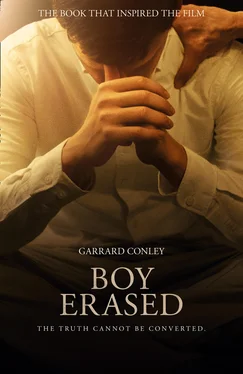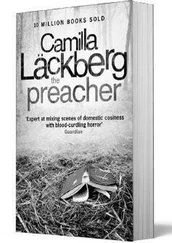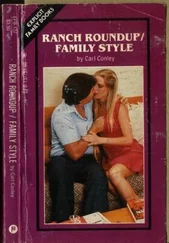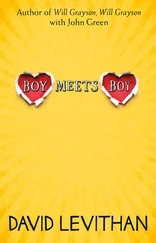I could feel my face glow red. I slapped the book shut and stared at my feet.
“I don’t …”
The tile was dry now, and in the prints left behind by the men’s rubber outsoles rested a skim of ultraviolet pollen. There were floors to be mopped. Outside, rows of cars would need spraying down with the pressure washer, last night’s rain now dried water spots on my father’s inventory.
“It’s okay, son,” my father said, not looking up from his Bible. “We can do this some other day.”
My mouth was dry, my tongue a paperweight weighing down my syllables.
“I lost my train of thought,” I said, looking away, catching sight of our group’s reflection in the Mustang’s rear window. Our figures stretched by the convex glass, we looked like one long thin band of a gold ring, broken only by the space between my right leg and the arm of the couch.
Brother Nielson opened his Bible to another passage and cleared his throat. “That’s okay,” he said. “Some of us aren’t cut out for the reading of scripture.” He began to speak of the glories of Heaven and everlasting life.
SITTING WITH my mother and father and Chloe hours later at the Timberline, I would fume about Brother Nielson’s words. I would glare at the gigantic radial saw across from our table and imagine it lifting from the curved nail that pinned it to the wall. I would imagine it splitting our town in half. That night, I would dream of Brother Nielson standing at the edge of one half of a living room that had been split down the middle, drifting gradually away from the rest of our town, his sagging boxers flapping in the wind, unable to leap across the widening gap with his tired and broken body, lost in a continental drift.
The truth was, Job’s friends hadn’t understood. Not Eliphaz, Bildad, or Zophar. Job lost his livestock, his wife, his two beautiful daughters—everything. A toss of the coin, and everything was gone. Only a mediator like Elihu, the youngest of Job’s friends, could hint at the complexity of Job’s loss.
A good family, a good house, a good car. To these men, and to me at the time, these were the necessary elements in securing decades of good luck. No matter that we now traded in cars rather than in livestock; no matter that the machinery of war, of Humvees cutting desert paths, was something we would never come to see or understand. At the end of the story, God would provide Job with a different wife, a different set of children, new livestock. Whatever happened—no matter how much we might suffer—if we had faith, God would restore it all, graft the skin back in place, mold us new bodies from our bone-tired ones.
LIKE THE NIGHT BEFORE, a thunderhead was moving across the Ozarks. “A cold front that’ll break up by morning,” the weatherman had said, his Midwestern accent clipping his words before they could slide into a Southern drawl. “You’ll hardly feel it,” he said, smiling, hazel eyes sparkling in the studio lights.
I lay awake in my bed, rereading Job in the hopes of finding a simple explanation for the scripture. I tried to quiet the critical part of my brain, the one that had caused me to stutter and falter during that morning’s Bible study.
Sometimes it was simply the act of looking at the open Bible that gave me a sense of belonging. Sometimes opening the Bible and pressing the pages flat with my palm, adding an extra crack in the spine, brought me closer to my father. I ran my thumb down the indented tabs, pressed into the sides of the book until the words took on a heft I might carry and lift up as proof of my devotion. I closed the Bible and placed it on my nightstand.
Chloe texted me a few minutes later, the phone’s vibrations pulling me out of semiconsciousness: “What’s up?”
“Nothing,” I wrote, burying the clamshell phone under my pillow. I felt like smothering the vibrations until they stopped. From the moment she showed up at the dealership, Chloe had continually asked me how the Bible study had gone. I had evaded the question by mumbling a “fine” every now and then.
Because he wasn’t snoring as usual, I could tell my father also lay awake. I was afraid that the storm wasn’t what kept him from sleep. The reverberating claps that shook so many households awake that night, sending deer scurrying across roads to smash into the sides of cars, were less severe than those that must have accompanied my father’s own fears for his son. I listened for his praying for several minutes, wondering if he was experiencing another moment when Jesus stood over his bed and bled onto the sheets. My father claimed he was often burdened with such visions.
When he finally fell asleep, his snoring was almost loud enough to shake the gilded picture frames lining the hallway just outside my bedroom. Years before, my mother had moved to an adjacent guest bedroom, saying she needed time away from the earthquake that was my sleeping father, from the whining bedsprings accompanying each inhalation. When I was very young, seven or eight years old, I would wake from scripture-inspired nightmares—blue cones of flame licking my feet, chasm after chasm opening up out of a blackness more felt than seen—and walk the hallway to my father’s bedroom to stand at the edge of his bed and wish him awake. I thought he should have understood me without the need for words, that the current between us was so free-flowing and deep he would have no choice but to wake up that instant. I would stand beside the mirrored closet and see the reflected room limned by the blue light of the television he left going all night, shaking and furious, terrified that I would have to return to my nightmares. Hours later, I would cross the hallway to my mother’s bedroom to perform the same absurd ritual. But after only a few minutes, my mother would feel me standing there and pull me beside her in the bed, moving over so I could have the warm spot.
“Love,” she would say.
“Love,” I would mumble, turning on my side, gliding my hand across the warm sheets until the scent of her lavender body lotion covered my skin.
The phone buzzed again under my pillow. The buzzing grew stronger, louder, until the blurred edges of my vision snapped into focus. I stared into the slats of the bunk bed I had kept even through high school because my mother would sometimes take the top bunk in the middle of the night, falling asleep with one thin arm dangling over the side. Now I pictured the wood cracking, the board coming down hard. Finally, after several rounds of buzzing, I reached under the pillow and snapped open the phone.
“Why are you ignoring me?” Chloe said.
“I’m just tired,” I lied. I knew she was the one who could most comfort me, but I was afraid that by telling her about my failure at the dealership I’d have to reveal a truth I wasn’t ready to admit to anyone. Not just that I might not be cut out for my father’s line of work, but that I might not be cut out for any of the Lord’s work, that just by having certain urges and entertaining certain thoughts I had already ended up on the wrong team.
“The storm.” When she grew worried, her voice rose nearly an octave. I wanted to be the kind of boyfriend who felt like her natural protector, the one to shelter her, even if it now seemed I needed her much more than she needed me.
“It’ll be okay,” I said. When was the right time to tell her what was going on? What would I even say? And if I told her, if I just came out and said it, what would stop her from leaving me for someone more promising, someone with less baggage? I knew it was wrong to assume she’d just quit on me. Chloe wasn’t the kind of person to give up on anyone; she was one of the most optimistic people I’d ever met. But I couldn’t imagine a scenario in which she stayed, in which we both had to live with the knowledge of my brokenness. Telling her the truth would end whatever tenuous grasp I now had on a normal life. Whereas if I could just work through it on my own, if I just had enough time, I might be able to preserve our innocence. If it all worked out in the end, I might be able to live with my deception, and my past urges would come to seem like nothing more than lies Satan had tried to make me believe. I would have the satisfaction of knowing that I had never listened to those lies, never given them a proper expression, that I had chosen the true version of our life together. None of this felt like selfishness at the time.
Читать дальше












